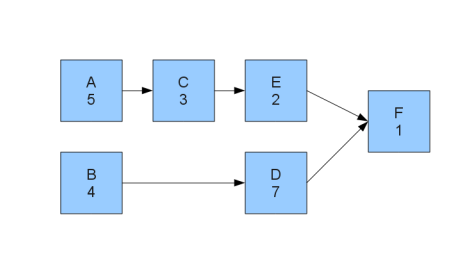Task Scheduling Example
Given this information derived from a Work Breakdown Structure
Activity
|
Immediate Predecessor
|
Estimated Days
|
A
|
-
|
5
|
B
|
-
|
4
|
C
|
A
|
3
|
D
|
B
|
7
|
E
|
C
|
2
|
F
|
D,E
|
1
|
1. Draw the corresponding task network diagram:

Now that we see the dependencies visually, it's easy to determine
start/finish dates.
2. Create a table of this information:
Activity
|
Earliest Start
|
Earliest Finish
|
A
|
1
|
5
|
B
|
1
|
4
|
C
|
6
|
8
|
D
|
5
|
11
|
E
|
9
|
10
|
F
|
12
|
12
|
From this we can conclude that the project will take a minimum of 12
days.
3. Next transform this into a timeline chart but don't worry about
real-life dates yet.
1 2 3 4 5 6 7 8 9 0 1 2 3
A [ - - - ]
B [ - - ]
C
[
-
]
D [ - - - -
- ]
E
[
]
F
[]
4. Now map the above chart onto an actual calendar, say Feb 5, 2003.
1
2
5 6 7 S S 0 1 2 3 4 S S 7 8 9 0
A [ - - - ]
B [ - - ]
C
[
-
]
D
[
-
-
- -
- ]
E
[
]
F
[]
From this we can determine that the earliest we'll be done is Feb 21.
5. Using a tool such a Gnome Planner, you can omit steps 3 and 4 and
create a Gannt chart directly. The tool shows the critical path
with
arrows, and slack times are shown in green.


